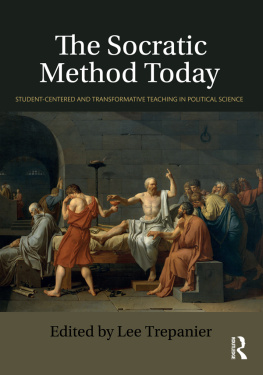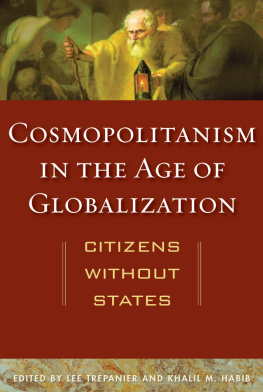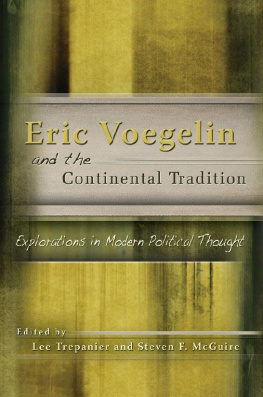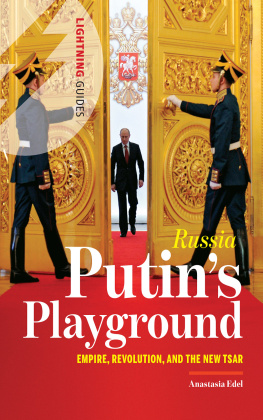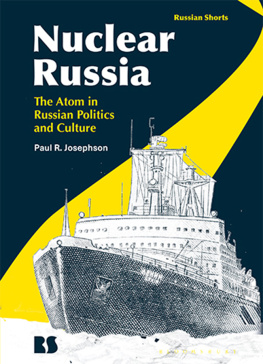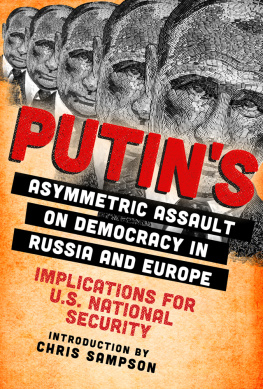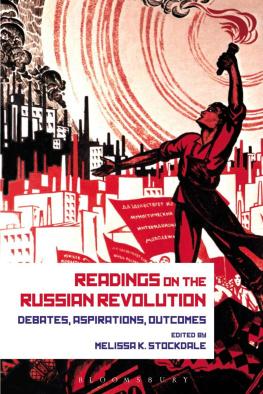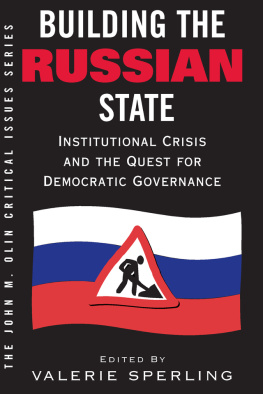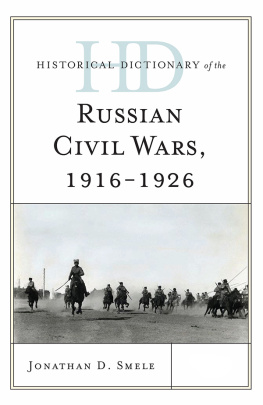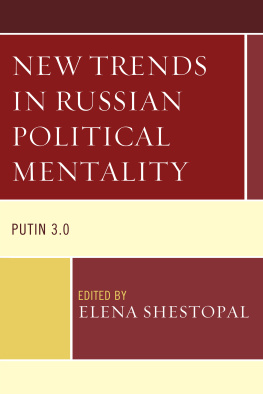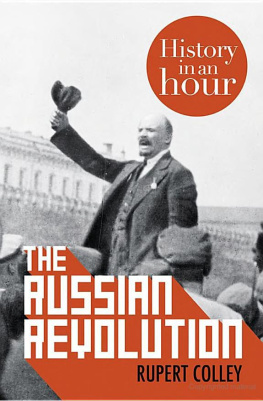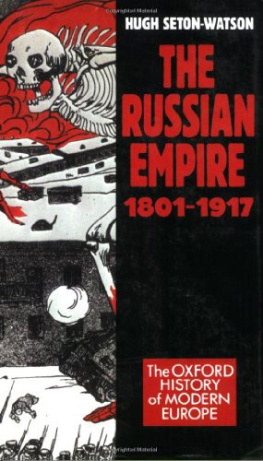About the Author
Lee Trepanier is an assistant professor of political science at Saginaw Valley State University. He received both his doctorate (2001) and his masters (2000) degrees in political science at Louisiana State University and his bachelors degree (1995) in political science and English literature at Marquette University.
Acknowledgments
T his work is the culmination of nearly a decade of my contemplation on the Russian Orthodox Church and state as political symbols from their inception to today. Admittedly it is a strange and difficult subject; but along this path, I have been given tremendous encouragement, opportunities, and criticism from my family, friends, and colleagues. It is only fitting that in this work that I acknowledge and thank them for their support throughout this long process and to accept any failures in this book as solely and entirely as my own.
My earliest attempts to articulate my thoughts on the Russian Orthodox Church and state were in graduate school in the Political Science Department at Louisiana State University; this work eventually concluded in my dissertation as directed by Dr. Cecil Eubanks and Dr. Ellis Sandoz, whose guidance and criticism forced me to clarify my thoughts on this subject. I also want to thank at LSU Dr. James Stoner and Dr. Leonard Stanton: the former for buoying my spirits when they were depressed; the latter for refining my skills in the Russian language and deepening my knowledge of Russian Orthodoxy. And I cannot forget to mention Morgan Knull and Anthony Procopi, whose wit and charm provided grace and beauty to the difficult and complicated life of graduate school, especially when writing the dissertation in political philosophy.
Dr. Christopher Marsh and Dr. Nikolas Gvosdev have my deepest gratitude for inviting me to participate at their symposium, Civil Society and the Search for Justice in Russia, at Baylor University in February 2001. This symposium eventually produced their book, Civil Society and the Search for Justice in Russia (2002), which explores this theme from a variety of theoretical perspectives. For me, the symposium was an opportunity to see whether Eric Voegelins new science of politics could be applied to study Russian politics, particularly the Russian Orthodox Church and state. The feedback on my presentation was invaluable, and I have incorporated it initially into my dissertation and later into this book.
Constructive criticism also was given to me from my friends and colleagues as well as from the anonymous reviewers for Lexington Books all of whom I sincerely want to thank for their comments. I believe the work is much better for it, and I have tried to follow their suggestions as closely as possible. I furthermore want to thank the editors and staff at Lexington Books as well as the support staff at Southern Utah University and Saginaw Valley State University, particularly Ms. Saun Strobel, for all their assistance in this process.
Finally, I want to acknowledge and appreciate those in my personal life for their constant love, friendship, and sense of humor that makes life a little bit lighter to live by. My parents and my siblings as well as the Procopi and Nishi families have sustained me these past years and it was their love and friendship that has made my existence possible. But it is my wife, MiJung, whose love and belief in me have led me to conclude this lengthy process of writing this book. It is to her that this work is dedicated; and it is to her that my being wholly belongs.
Select Bibliography
Alekseev, V. A. Illiuzii i dogmy. Moscow: Politizdat, 1991.
Avvakum. The Life of the Archpriest Avvakum by Himself , trans. Jane Harrison and Hope Mirrless. Hamden, CT: Archon Books, 1963.
Barbour, Philip L. Dmitriy Called the Pretender: Tsar and Great Prince of All Russia, 16051606 . London: Macmillan, 1967.
Baron, Samuel H., trans. and ed. The Travels of Olearius in Seventeenth-Century Muscovy . Stanford, CA: Stanford University Press, 1967.
Belliustin, I. S . Description of the Parish Clergy in Rural Russia: The Memoir of a Nineteenth-Century Parish Priest , trans. Gregory L. Freeze. Ithaca, NY: Cornell University Press, 1985.
Berdyaev, Nicholas. The Realm of Spirit and the Realm of Caesar . Westport, CT: Greenwood, 1952.
Billington, James H. The Icon and the Axe . New York: Knopf, 1966.
. Russia in Search of Itself . Baltimore: Johns Hopkins University Press, 2004.
Bladgovidov, F. V. Deiatelnost russkogo dukhovenstva v otnoshenii k narodnomu obra-zovaniiu v tsarvovanie imp . Aleksandra II. Kazan: Tip. Imp. universiteta, 1891.
Bokov, Kh., and S. V. Alekseev. Rossiiskaia ideia i natsionalnaia ideologiia narodov Rossii . Moscow: Russian Press Service, 1996.
Bourdeaux, Michael. Religious Minorities in the Soviet Union. London: Minority Rights Group, 1984.
. The Politics of Religion in Russia and the New States of Eurasia . Armonk, NY: M. E. Sharpe, 1995.
Brown, William Edward. A History of Seventeenth-Century Russian Literature . Ann Arbor, MI: Ardis, 1980.
Budovnits, I. U. Russkaia publitsistika XVI veka . Moscow and Leningrad: 1947.
Bussow, Conard. The Disturbed State of the Russian Realm , trans. and ed. G. Edward Orchard. Montreal: McGill-Queens University Press, 1994.
Cherepnin, L. V. , ed. Pamyatniki prava perioda obrazovaniya russkogo tsentralizo-vannogo gosudarstva, XIIVXV vv . Moscow: Izd. sotsialno-ekon. lit-ry, 1955.
Cherniavsky, M. Tsar and People: Studies in Russian Myths . New Haven, CT: Yale University Press, 1961.
Chistovich, I. A. Rukovodiaschchie deiateli dukhovnogo prosveshchennia v Rossii v per-voi polovine tekushchego stoletiia . St. Petersburg: 1894.
Cracraft, James. The Church Reforms of Peter the Great . Stanford, CA: Stanford University Press, 1971.
Crummey, Robert O. The Old Believers and the World of Antichrist; the Vyg Community and the Russian State (16941855) . Madison: University of Wisconsin Press, 1970.
. The Formation of Muscovy, 13041613 . 3 vols. New York: Longman, 1987.
Curtiss, John S. Church and State in Russia: The Last Years of the Empire, 19001917 . New York: Columbia University Press, 1940.
. The Russian Church and the Soviet State, 19171950 . Boston: Little, Brown & Co., 1952.
Davis, Nathaniel. A Long Walk to Church: A Contemporary History of Russian Orthodoxy . Boulder, CO: Westview Press, 1995.
Derzhavina, O. A., and E. Kolosova, eds. Vremennik Ivana Timofeeva . Moscow and Leningrad: Izo. Akademii nauk SSSR, 1951.
. Skazanie Avraamiia Palitsyna . Moscow and Leningrad: Izo. Akademii nauk SSSR, 1955.
Dobroklonskii, A. Ruskovodstvo po istorii russkoi tserkvi . 3 vols. Ryazan: 1889.
Dunlop, John. The Faces of Contemporary Russian Nationalism . Princeton, NJ: Princeton University Press, 1983.
Dvornik, F. The Photian Schism, History and Legend . Cambridge: Cambridge University Press, 1948.
Dyakonov, M.A. Vlast moskovskikh gosudarey. Ocherki iz istorii politicheskikh idei Drevnei Rusi do kontsa XVI veka . St. Petersburg: 1889.
Ellis, Jane. The Russian Orthodox Church, A Contemporary History . London: Croom Helm, 1986.
Evgenii, Metropolitan. Slovar Istoricheskii, o byvshikh v Rossii pisateliakh dukhovnago china greko-rossiikoi tserkvi . 2 vols. St. Petersburg: 1827.
Fadner, F. Seventy Years of Pan-Slavism: Karazin to Danilevskii, 18001870 . Washington, DC: Georgetown University Press, 1962.
Fedotov, George P. The Russian Religious Mind: Kievan Christianity, the Tenth to the Thirteenth Centuries . New York: Harper and Row, Torchbooks, 1960.
. St. Filipp Metropolitan of MoscowEncounter with Ivan the Terrible . Belmont, MA: Norland, 1978.
Fennell, John. The Emergence of Moscow . Berkeley: University of California Press, 1968.


